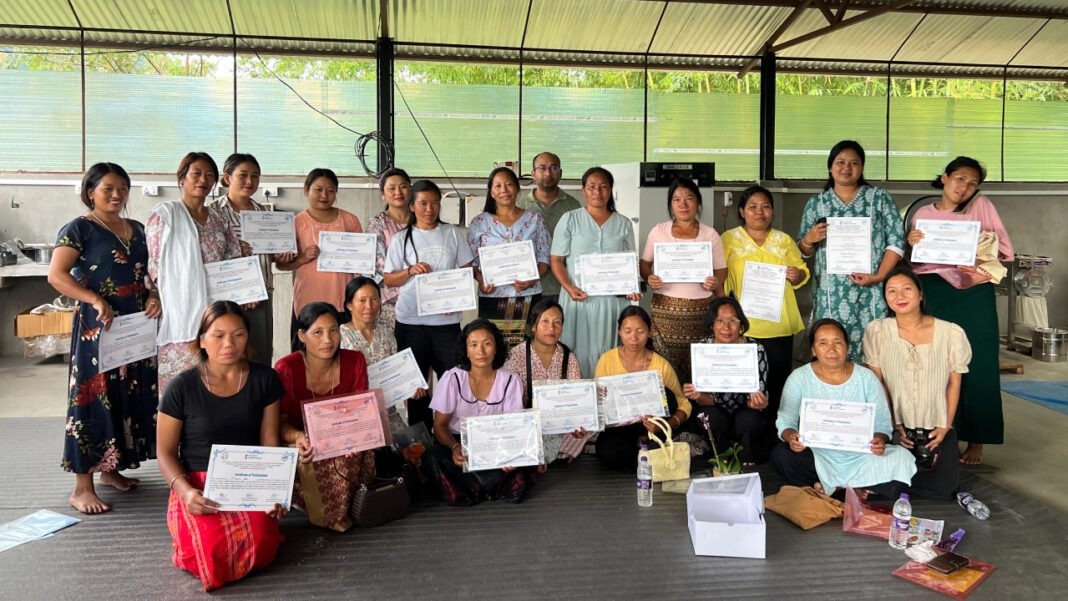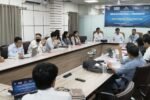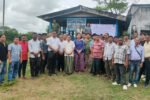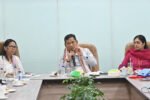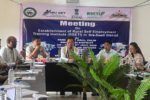HT Correspondent
DADAM, July 11: A three-day programme titled “Inauguration of the Women Technology Park (WTP) Millet Processing Unit and Workshop cum Hands-on Training on Millet Processing and Value Addition” was held successfully from July 9 to 11 at Dadam village in Arunachal Pradesh’s Tirap district.
The programme was organised as part of the project titled “Capacity Building of Rural Women on Processing and Value Addition of Millets/Underutilised Crops Through Technology Adoption and Awareness for Nutritional Security in Dadam Village,” sanctioned by the Science for Equity, Empowerment and Development (SEED) Division of the Department of Science and Technology, Government of India.
According to an official statement, the project is being implemented by the DBT-APSCS&T Centre of Excellence (CoE) for Bioresources and Sustainable Development at Kimin under the Arunachal Pradesh State Council for Science & Technology, Department of Science & Technology, Government of Arunachal Pradesh, in collaboration with the Kindle Foundation, Khonsa.
The Women Technology Park Millet Processing Unit was formally inaugurated on July 9 by Chakat Aboh, MLA of 56 Khonsa-West Assembly Constituency and Advisor to the Minister of Transport, Government of Arunachal Pradesh.
The inaugural event was attended by Deputy Commissioner of Tirap Techu Aran, Circle Officer of Dadam Dr Mekong Taku, Agriculture Development Officer Nowang Wangnow, the Chief of Dadam village, and members of local Self-Help Groups (SHGs), among others.
Project Investigator Dr Joram Aku, Scientist-B at the CoE for BRSD, welcomed the gathering and provided an overview of the Centre’s rural bioresource initiatives.
She underlined the role of millets in ensuring food security, promoting nutrition, and enhancing climate-resilient agriculture.
Highlighting the utility of the newly inaugurated processing unit, she stated that it would enable women in Dadam village to acquire practical skills in post-harvest processing, packaging, and value addition of millets, while also paving the way for grassroots entrepreneurship.
Addressing the gathering, ADO Nowang Wangnow spoke on the rising significance of millet cultivation and urged SHG members to adopt sustainable agricultural methods.
He encouraged them to explore viable market linkages to position millet-based products as nutritious and health-conscious alternatives.
Deputy Commissioner Techu Aran reiterated the nutritional and medicinal importance of millets and encouraged the women to incorporate them into their daily diets.
He described millet processing as a viable avenue for small-scale, home-based enterprise development, capable of improving household income and promoting women’s financial self-reliance.
In her address, MLA Chakat Aboh expressed appreciation for the establishment of the processing unit and encouraged the local women to make full use of the facility.
She described the project as a key step toward women’s empowerment, skill development, and improved nutritional outcomes, and voiced hope that the Women Technology Park would become a model for community-led progress in the region.
The inaugural session concluded with a vote of thanks delivered by Er Sourav Kr Pathak, Scientist-C at the CoE for BRSD, who thanked all officials, trainers, and SHG members for their participation.
He noted that the WTP had the potential to become a platform not just for millet processing, but also for sustained socio-economic development, entrepreneurship, and women-led innovation in the district.
Following the inaugural event, a hands-on workshop and training session on millet processing and value addition was conducted over the three days.
A total of 23 participants from different SHGs took part in the training, which was conducted by Juri Sonowal, Project Coordinator, and Dulumoni Regon, Trainer, from Ayang Trust, Majuli, Assam. Participants were given practical demonstrations on millet processing and the preparation of value-added products including foxtail millet cakes, laddoos, and cookies.
They were also trained in hygienic food handling, basic packaging techniques, and effective product presentation for local market sales.
The programme concluded on July 11 with a short valedictory function, during which certificates were distributed to both participants and trainers.
The event marked a significant step forward in advancing rural livelihoods and promoting nutritional security through technology-enabled millet processing and community capacity building.
The successful implementation of the programme was made possible with the support and guidance of Er C D Mungyak, Director-cum-Member Secretary, Arunachal Pradesh State Council for Science & Technology, and Dr Debajit Mahanta, Joint Director of the same council and Project Director of the DBT-APSCS&T CoE for BRSD, Kimin.
Their oversight and facilitation were instrumental in aligning the initiative with the broader goals of promoting science and technology for rural development in the state.


